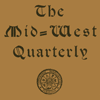
Mid-West Quarterly (1913–1918)
Date of this Version
October 1913
Document Type
Article
Abstract
In a Phi Beta Kappa address given last year before certain university audiences of the middle west, the head of the Columbia School of Journalism, Dr. Talcott Williams, made something of a text of the dearth of contemporary literary activity of the highest order. His reference was chiefl y to poetry, but he seemed to feel that there is now relative sterility nearly everywhere in the literary field. Th e period seemed to him not perhaps so much an interregnum, for that holds promise of succession to vacant thrones, as a period of decline; and this decline he felt to be bound up more or less directly with the waning of humanistic study consequent upon the substitution in the colleges of the "new" learning for the "Old." Th irty years ago, he pointed out, advocates of the retention of classical study as basic in education made the pre diction that with the relative elimination from the curriculum of the “humanities,’’ tested by centuries as an inspiring infl uence in education, there would come decline in the intellectual output of our colleges and in literary creation. Th is prediction, he added, has come true. Where now, he asked, are our Long-fellows, our Lowells, our Emersons, our Laniers? At how many colleges do students discuss across the table at mealtime the current poem of some great poet? Here would be a topic which the modem student never discusses nor dreams of discussing. Th e present generation has neither the students nor the poets. Nbr has it critics; nor, he seemed to fear, since the death of William James, has it philosophers. He implied, though not perhaps stating the belief in specifi c words, that the discarding of the “humanities” in the modem college curriculum and the absence of strong present-day literary inspiration stand to each other in the relation of cause and effect. The two are interrelated and their falls have synchronised.


Comments
Published in Th e Mid-West Quarterly, 1:1 (October 1913), pp. 73–82.